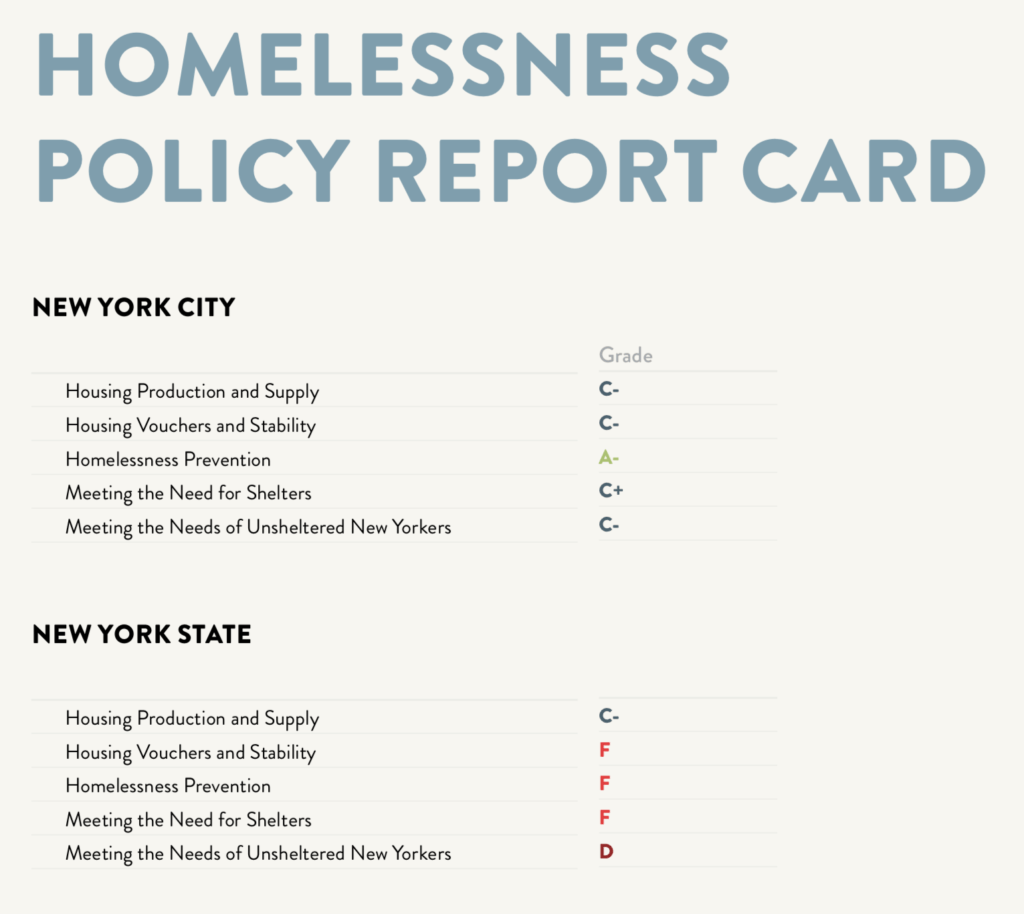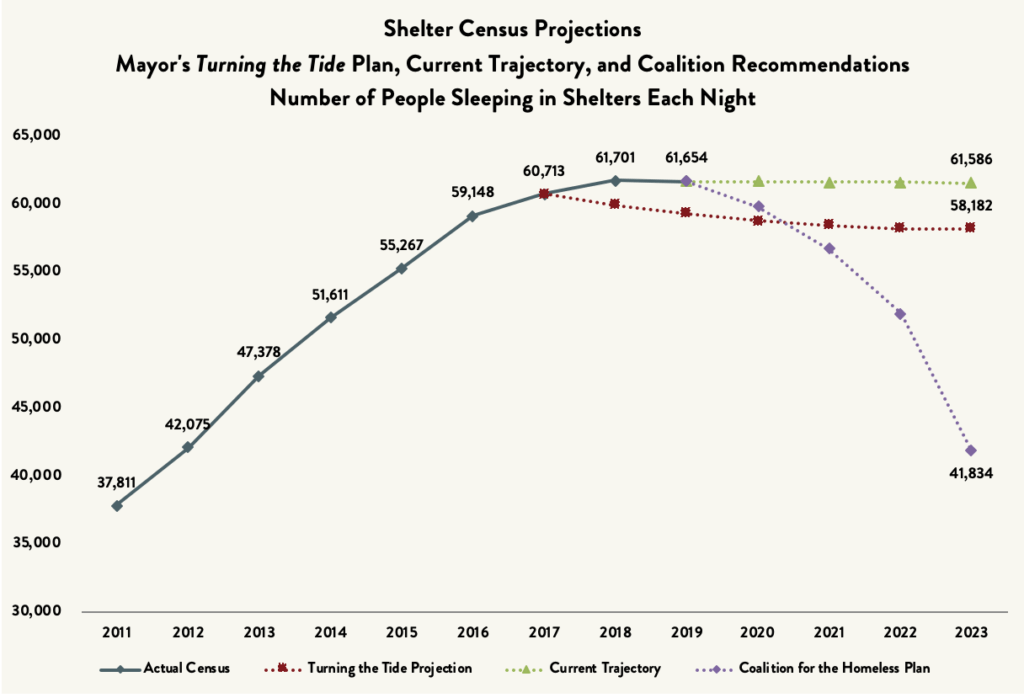Analysis Finds Surge in Single Adult Homelessness Fed by Discharges from State Institutions; Criminalization of Street Homelessness and Bureaucratic Shelter Applications for Families Making Crisis Worse
As New York Grapples with the Threat of Coronavirus, Report Urges Governor to Include Home Stability Support (HSS) in State Budget to Help Most Vulnerable New Yorkers
NEW YORK, NY — The Coalition for the Homeless released its State of the Homeless 2020 report today, providing a comprehensive look at homelessness in New York City. The report comes amidst the threat of novel coronavirus, which exposes the vulnerability of living without the security and privacy of a home: The report cites the disproportionately high rates of disability as well as physical and mental health issues among homeless New Yorkers, and further notes the growing number of homeless individuals over the age of 65.
State of the Homeless 2020 analyzes the institutional forces that drive record homelessness, highlights the plight of those sleeping unsheltered on the streets and in the subways, and illustrates how the City’s bureaucratic shelter application process for homeless families may actually conceal the true scope of family homelessness in New York. The report notes that homelessness is unequivocally an issue of racial justice by highlighting enormous disparities between the rates of homelessness among Black, Hispanic, and White New Yorkers.
The number of single adults sleeping each night in New York City Department of Homeless Services (DHS) shelters increased by a staggering 143 percent, from 7,700 in December 2009 to 18,700 in December 2019. Releases from State prisons directly to DHS shelters are partly to blame for the growth in single adult homelessness: In 2018, more than 3,400 individuals were released from State prisons directly to shelters in New York City. Between 2015 and 2018, more than 15,000 such individuals were sent to City shelters by the State.
While the number of families sleeping each night in DHS shelters has levelled off in the past three years, that figure remains stubbornly high: In December 2019, 14,792 families slept in shelters each night. Shockingly, 1 in every 100 babies born in New York City last year was brought “home” from the hospital to a shelter.
As in past years, State of the Homeless includes a “report card” that grades the State and City on their respective efforts to prevent homelessness, provide housing vouchers, produce affordable and supportive housing, and meet the needs of homeless individuals and families sleeping in shelters or staying on the streets and subways. The report evaluates these and other key policy areas that impact homeless New Yorkers.

“New York City’s homelessness crisis will not improve until Governor Cuomo and Mayor de Blasio treat homelessness like the urgent humanitarian crisis it is and acknowledge that it is fueled by the massive lack of affordable housing. Homelessness is not an issue that can be pushed into the shadows as we have seen through the wrongful criminalization of unsheltered individuals, nor is it a crisis that can be managed by implementing bureaucratic deterrents at the front door of the shelter system. State of the Homeless 2020 shows that Governor Cuomo is failing at addressing homelessness, most disturbingly by allowing thousands of individuals to be released from hospitals, jails, and nursing homes directly to shelters. The proven, humane, and fiscally sound housing solutions to mass homelessness, like Home Stability Support (HSS), that are outlined in this report should be top priorities for both Governor Cuomo and Mayor de Blasio. Only then can we fundamentally change things for the better,” said Giselle Routhier, Policy Director for the Coalition for the Homeless.

Recommendations
State of the Homeless 2020 outlines key steps the City and State can take immediately to increase housing options for homeless New Yorkers and improve shelter conditions and processes, which will in turn dramatically reduce homelessness.
Housing
Governor Cuomo must:
- Implement the Home Stability Support (HSS) program to create a State-funded, long-term rent subsidy for households receiving public assistance who are homeless or at risk of losing their housing due to eviction, domestic violence, or hazardous housing conditions.
- Accelerate the pace of production of the 20,000 units of supportive housing pledged by the Governor in 2016 by completing them within 10 rather than 15 years, and fully fund the construction and operation of the remaining 14,000 units.
- Follow the recommendations of the Bring it Home Campaign and adequately fund existing community-based housing programs for individuals with psychiatric disabilities.
- Ensure effective reentry planning for individuals being released from State prisons in order to identify viable housing options prior to each individual’s scheduled release date.
- Reform punitive parole practices that allow parole officers to exercise wide discretion and deny placement at potentially viable addresses for individuals leaving State prisons.
- Fund the creation of supportive housing specifically for individuals reentering the community from State prisons.
- Expand the Disability Rent Increase Exemption program (DRIE) to include households with a family member with a disability who is not the eligible head of household.
Mayor de Blasio must:
- Allocate at least $20 million in the fiscal year 2021 budget to help subsidize the increased production of housing mandated under Local Law 19.
- Greatly reduce reliance on SOTA and help families move out of shelters with long-term rent subsidies, including Section 8 vouchers.
- Allocate at least three-quarters of tenant-based Section 8 vouchers made available each year to homeless households so they can exit shelters.
- Accelerate the timeline for the creation of 15,000 City-funded supportive housing units by scheduling their completion by 2025 rather than 2030.
- Create an impartial appeals process through the Human Resources Administration (HRA) for individuals applying for supportive housing.
Mayor de Blasio and Governor Cuomo should together:
- Fund the production of more housing specifically for single adults, separate and apart from their respective existing supportive housing commitments.
- Expand access to supportive housing for adult families – a population with disproportionately high levels of disability and complex needs.
- Implement a system of notifying supportive housing residents of their rights as tenants and clients of service providers.
- Create a standard set of practices for supportive housing providers to interview and accept residents, with an emphasis on Housing First and low-barrier entry.
Shelters and Serving Unsheltered Individuals
Mayor de Blasio must:
- Apply elements of the Safe Haven shelter model to general shelters to make them more humane, respectful, and suitable for homeless individuals whose past experiences lead them to avoid shelters.
- Ensure all shelters serve individuals and families with dignity, provide a safe environment, and are adequately staffed at all times to provide meaningful social services, housing search assistance, and physical as well as mental health care and/or referrals.
- Expand the supply of Safe Havens by at least 2,000 beds to meet the needs of unsheltered individuals bedding down on the streets and other places not meant for human habitation.
- Reform the provision of food in shelters to improve quality, expand oversight, adequately accommodate the nutritional needs of shelter residents, and allow for dietary, religious, and other requirements.
- End the Subway Diversion Program and CCTV monitoring of homeless individuals, and end the practice of deploying police officers to respond to the presence of homeless people on the subways and streets.
- Administratively clear all summonses that have been issued under the Subway Diversion Program.
Governor Cuomo must:
- Reverse harmful cuts to New York City’s emergency shelter system that have resulted in the State short-changing the City by hundreds of millions of dollars over the past six years, and share equally with the City in the non-Federal cost of sheltering families and individuals.
- Conduct oversight of hospitals, nursing homes, and other institutions to prevent inappropriate discharges to shelters and the streets.
- Replace the grossly inadequate $45 per month personal needs allowance for those living in shelters with the standard basic needs allowance provided to public assistance recipients.
- Permanently eliminate the statewide requirement that shelter residents pay rent for shelter or enroll in a savings program as a condition of receiving shelter.
- Immediately end the initiative to place MTA police at the end of subway lines to target homeless individuals, and halt the plan to hire 500 additional MTA police officers, which will inevitably result in the disproportionate and discriminatory persecution of homeless and low-income New Yorkers, especially people of color.
Mayor de Blasio and Governor Cuomo should together:
- Implement a less onerous shelter intake process for homeless families in which 1) applicants are assisted in obtaining necessary documents, 2) housing history documentation is limited to the prior six months, and 3) DHS-identified housing alternatives are investigated to confirm their availability, safety, and lack of risk to the potential host household’s tenancy. For adult families, the City must accept verification of time spent on the streets from the widest possible array of sources, including outreach workers, soup kitchens, social workers, health care providers, and neighbors.
- Fund additional services for individuals living with severe and persistent mental illnesses, such as expanding access to inpatient and outpatient psychiatric care, providing mental health services in more single adult shelters, and adding more Assertive Community Treatment (ACT) teams for homeless people.
- Establish a structure to regulate, finance, and develop a medical respite program and longer-term residential supports to address the needs of individuals with medical conditions who are released from hospitals and other institutions, including those who may not have adequate documentation of their immigration status.